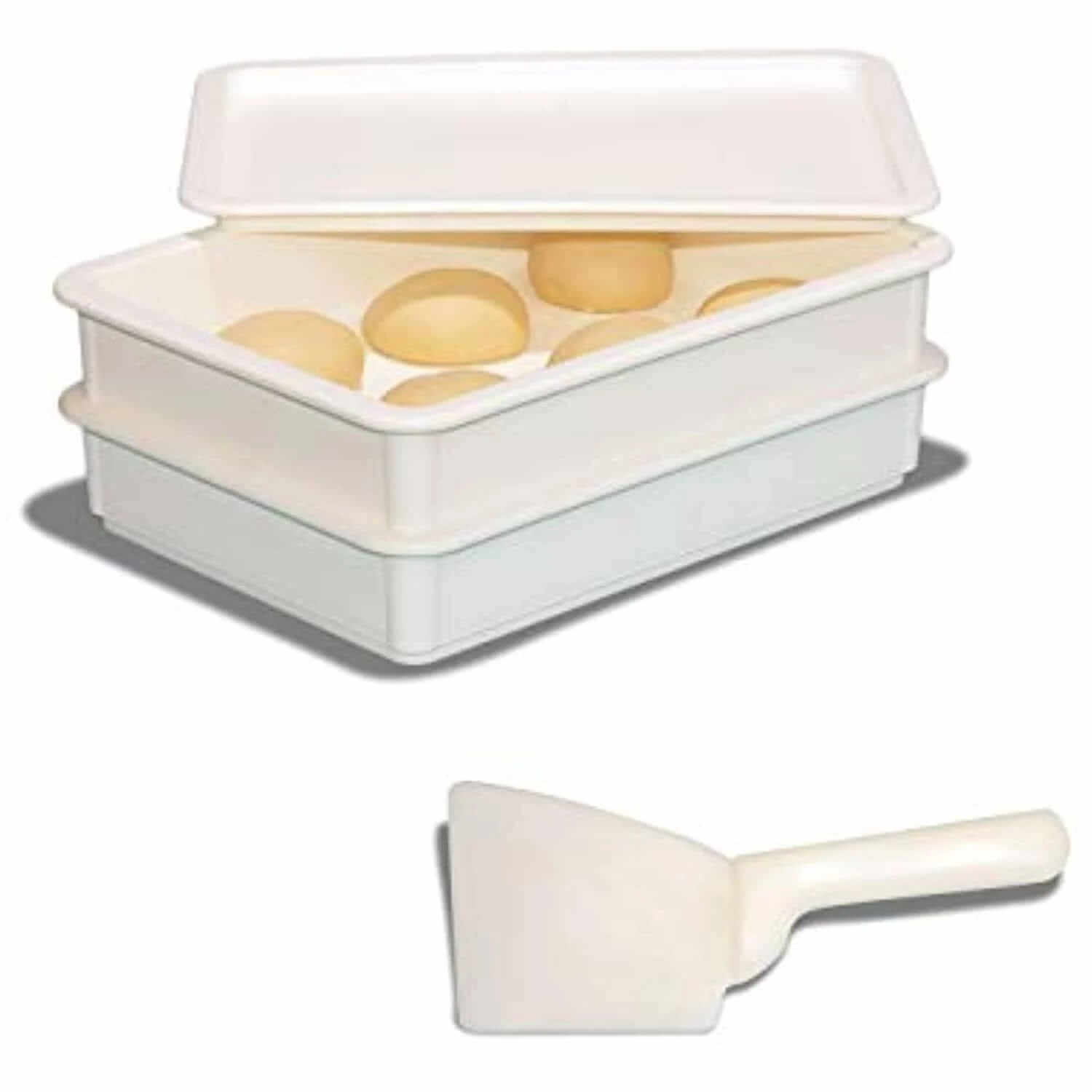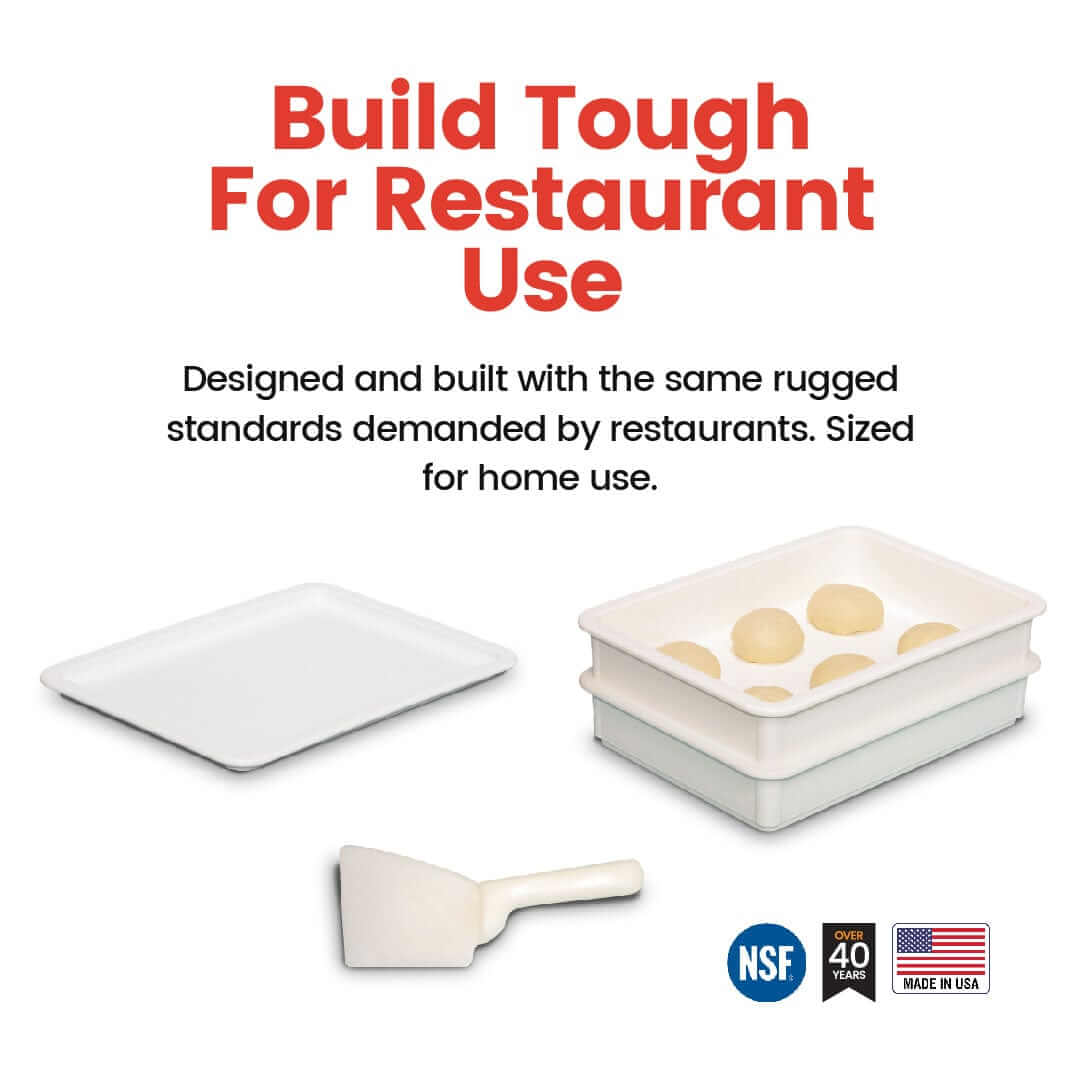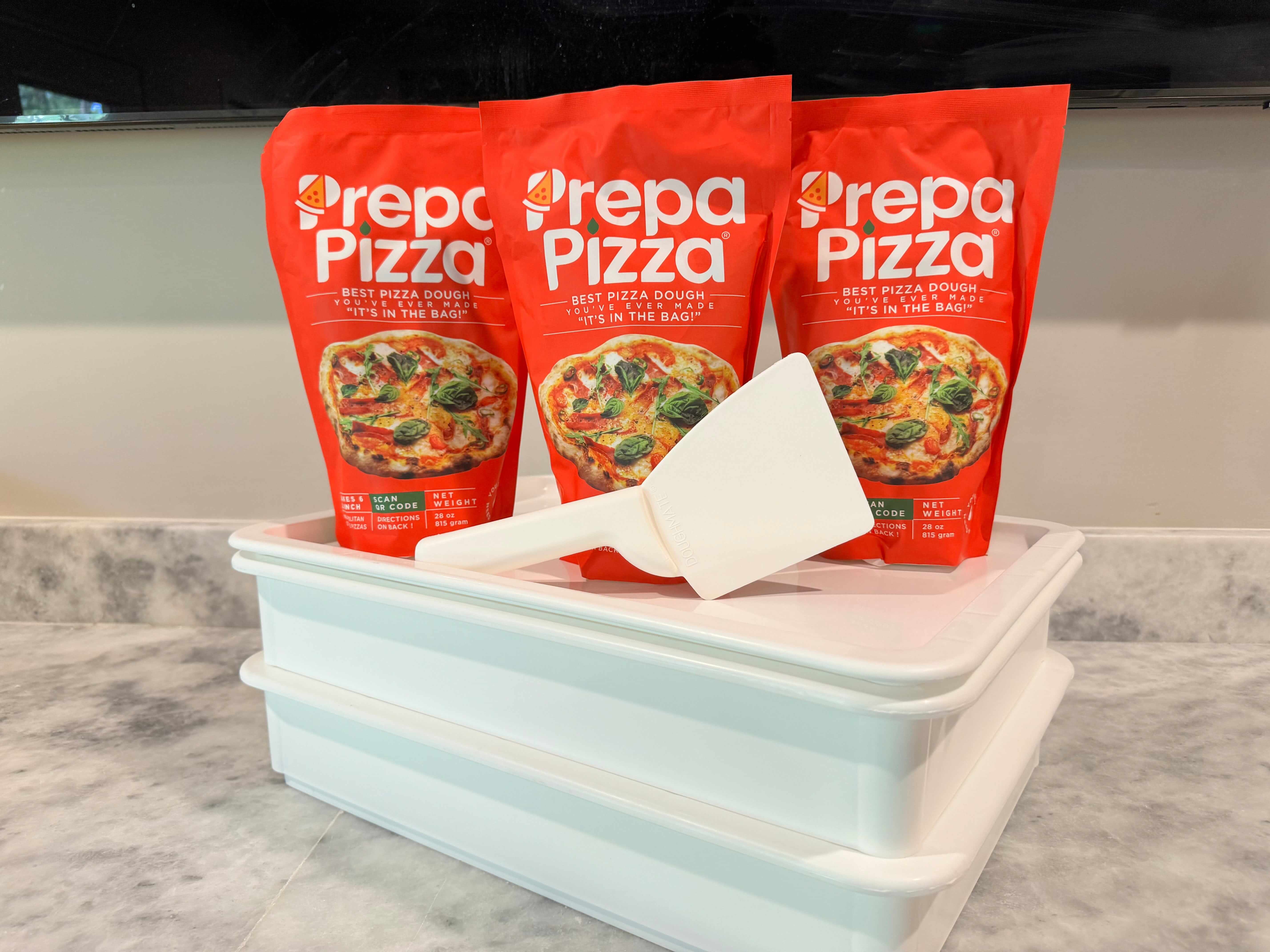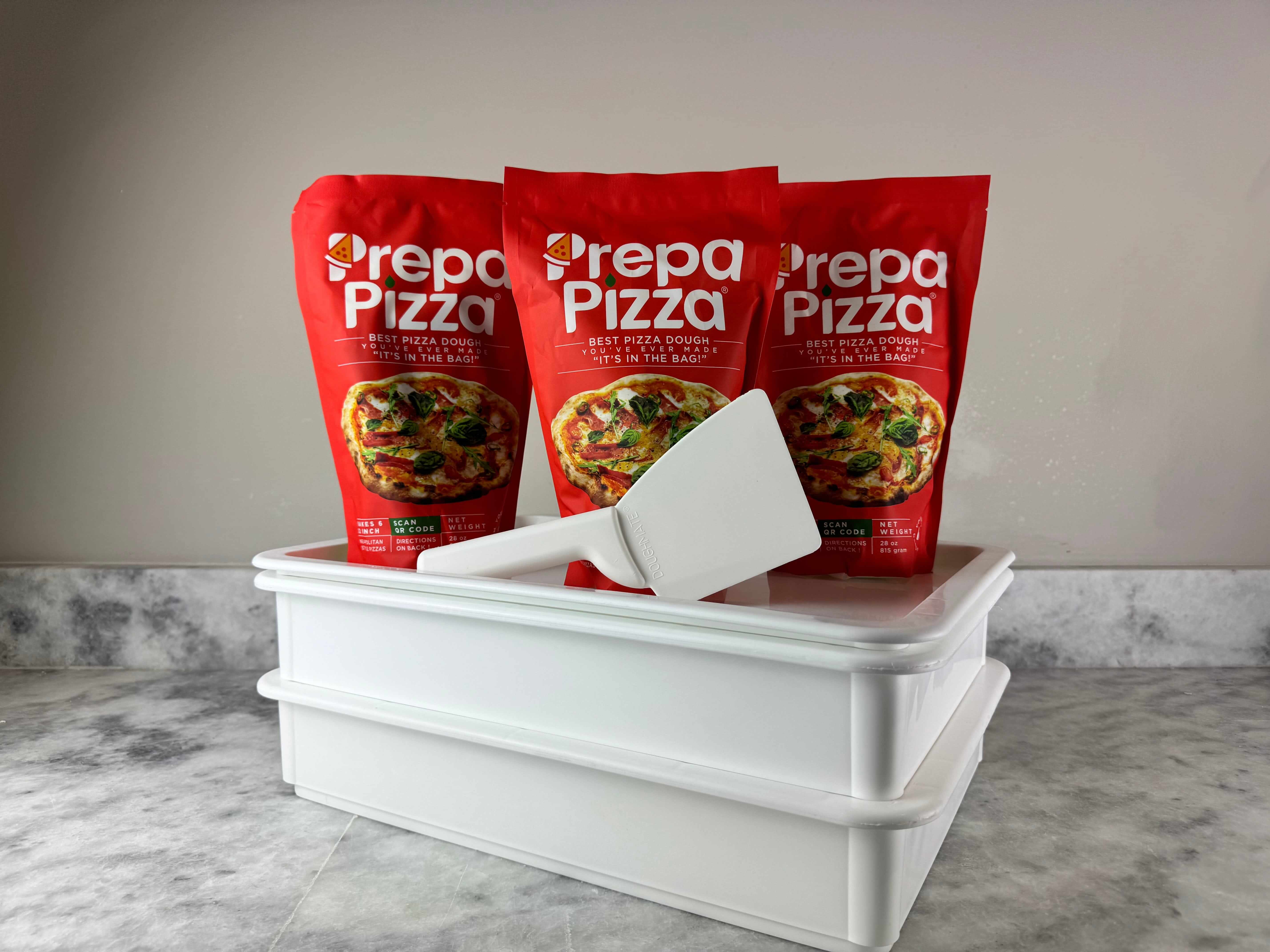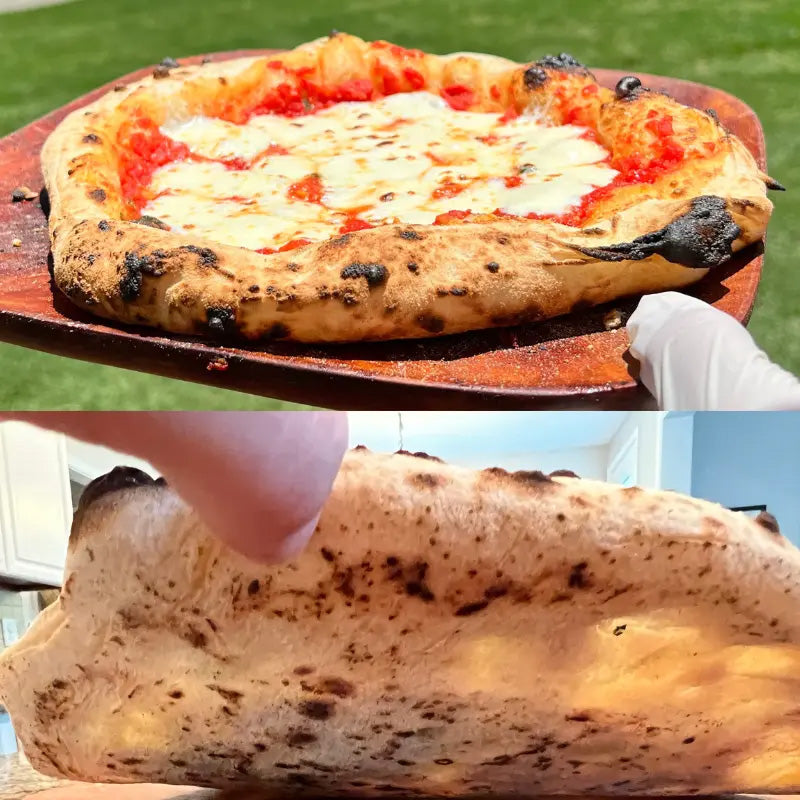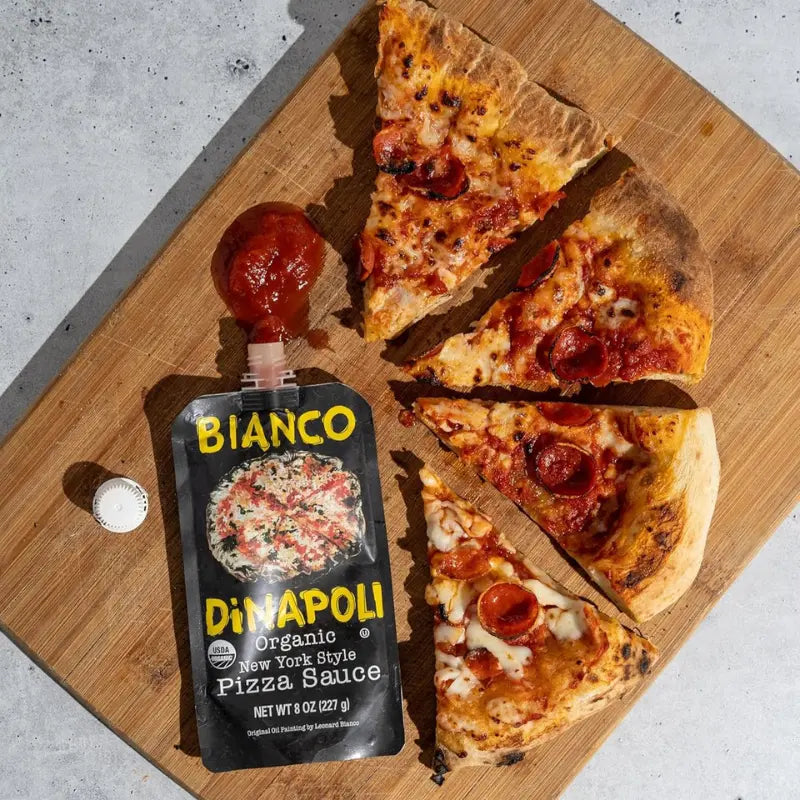
How Much Dough Per Pizza Size Explained for Perfect Crust Every Time
Knowing how much dough to use for each pizza size is key to making the perfect crust. For a 10-inch pizza, use about 180 grams of dough; for 12 inches, around 260 grams; and for a 14-inch pizza, approximately 350 grams. These weights help you achieve the right balance between thickness and chewiness every time.
If you're using premade dough, like the premium quality dough from Prepa Pizza, you can skip the guesswork and focus on creating delicious pies. Prepa Pizza’s dough is crafted with quality ingredients to deliver consistent results, whether you’re making a personal or a large pizza. You can explore their Prepa Pizza Dough Kit to simplify your dough prep while maintaining restaurant-quality standards.
Using the right amount of dough per pizza size ensures you avoid soggy or overly thick crusts. With Prepa Pizza’s ready-to-use dough, you have a reliable base that helps you control the thickness and texture, so your pizza turns out just the way you want it.
Understanding Pizza Dough Quantities by Pizza Size
Knowing how much dough to use for each pizza size helps you achieve the perfect crust every time. The amount of dough affects the thickness, texture, and cooking time, which vary with pizza diameter and style. Using premade dough from Prepa Pizza ensures consistent quality and ease in achieving these results with minimal effort. You can find Prepa Pizza’s premium premade dough kit here to simplify your pizza making.
Understanding dough weight per pizza size saves time and helps avoid waste. Whether making a 10-inch or 14-inch New York-style pizza, the right dough amount ensures even baking and the ideal balance of chew and crispness.
Common Dough Weights for Popular Pizza Sizes
Dough weight typically scales with pizza diameter. For New York-style crusts, which Prepa Pizza specializes in, the typical dough weights are approximately:
| Pizza Size | Dough Weight (grams) |
|---|---|
| 10-inch | 180 g |
| 12-inch | 260 g |
| 14-inch | 354 g |
Use this as a baseline, adjusting slightly for desired crust thickness. A 12-inch pizza generally requires around 260 grams of dough for a traditional New York-style crust. Heavier dough amounts will produce thicker and chewier crusts, while lower amounts create thinner bases. These measurements help maintain consistency across different pizza sizes.
Dough Distribution Based on Pizza Shape
Pizza shape influences how dough is distributed and stretched. Round pizzas require evenly stretched dough balls to create uniform crust thickness. Prepa Pizza’s dough is designed for easy handling and consistent stretch, crucial for maintaining even thickness.
For rectangular or Sicilian shapes, dough is often pressed and adjusted differently, requiring more dough per square inch to avoid overly thin crusts. While size in diameter is key for round pizzas, surface area becomes more important for other shapes, as dough must be spread without tearing. Understanding shape helps you measure dough accurately for the right texture.
How to Adjust for Thin or Thick Crusts
Crust thickness dramatically changes how much dough you need. For thin crust pizzas, use about 175 grams of dough for a standard 12-inch pizza. This produces a crisp outer layer with some chew.
For thick crust or deep-dish styles, increase dough weight up to 300 grams at 12 inches or more, ensuring a doughy, airy base. Prepa Pizza dough can handle both extremes, offering elasticity and rise for thick crusts or lighter stretch for thin ones.
Adjust your dough weight depending on crust preference but keep in mind that dough hydration and handling will also influence the final texture. Using premium pre-portioned dough from Prepa Pizza takes the guesswork out of these adjustments.
Ingredient Ratios and Dough Formulation
Understanding how ingredient ratios affect dough weight and texture is key to making the right amount of dough for your pizza size. Precise control of flour, water, salt, and yeast ensures consistent results, whether you make dough from scratch or choose premium options like Prepa Pizza’s premade dough. Using quality ingredients at the proper ratios maximizes dough performance and flavor.
You can customize dough hydration, salt content, and yeast type to modify dough elasticity, rise time, and handling, helping you scale dough weight with accuracy.
Essential Ingredients and Their Proportions
The core ingredients you need are flour, water, salt, and yeast. Flour forms the dough’s structure, so you usually use it as the base measurement—often 100% in baker’s percentages. Water, critical for gluten development, typically ranges from 60% to 70% of the flour weight, depending on the style. Salt is around 2% for taste and dough strengthening.
Yeast amount varies between 0.25% to 2%, depending on fermentation time and type (fresh or dry). Fresh yeast must be used in slightly higher amounts than dry yeast to achieve the same rise.
Prepa Pizza’s premade dough is balanced perfectly with these proportions. Its consistent dough weight per pizza size means less guesswork for you, ensuring a uniform base every time.
Hydration Percentages Explained
Hydration percentage is the ratio of water to flour by weight. A 65% hydration means 65 grams of water per 100 grams of flour. This largely controls the dough's texture and handling character.
Higher hydration (70% or more) results in softer, more elastic dough with an open crumb, typical of Neapolitan-style pizza. Lower hydration (60-63%) creates firmer, denser dough, easier to shape for styles like New York or Sicilian.
Adjusting hydration affects dough weight directly since more water increases total weight. Prepa Pizza’s dough is formulated to an optimal hydration, balancing workability and final crust quality.
Impact of Yeast Type on Dough Quantity
Yeast drives fermentation and gas production, affecting dough volume and flavor. Fresh yeast is moist and perishable but ferments faster and can be measured by weight more precisely. You typically need about twice the weight of fresh yeast compared to dry yeast for equivalent activity.
Using fresh yeast tends to require slight adjustments in dough quantity when scaling recipes, especially if you want consistent rise time. Dry yeast offers convenience but slower fermentation.
Prepa Pizza’s dough utilizes carefully measured yeast amounts to ensure consistent proofing and rise, matching dough weight properly to pizza size you want. This control helps prevent over-proofing or under-proofing, keeping your pizza base predictable and delicious.
Using Pizza Dough Calculators and Mathematical Formulas
Understanding how much dough you need for various pizza sizes helps you create consistent results every time. Precise calculations consider dough weight, hydration, and pizza diameter to balance texture and flavor. Using tools or formulas can take much of the guesswork out of your pizza making, especially if you use high-quality premade dough like Prepa Pizza’s premium dough kit.
With the right calculations, you can confidently prepare dough weights suited for different pizza types, from a 12-inch pizza to larger sizes. Prepa Pizza’s dough ensures consistent quality and ease, making it ideal whether you’re making dough from scratch or using their premade option.
How Pizza Dough Calculators Work
Pizza dough calculators determine precise ingredient amounts based on your desired pizza size and dough characteristics. You input values such as the number of pizzas, dough ball weight, and hydration percentage (water relative to flour). These calculators then output exact quantities of flour, water, yeast, salt, and oil.
Most tools allow customization for pizza styles, accommodating thicker crusts or thin Neapolitan styles. For example, adjusting hydration levels affects dough elasticity and crust crispness. Using Prepa Pizza’s premade dough complements these calculations by guaranteeing a quality base that meets your recipe’s needs without added measuring stress.
Using an online pizza dough calculator can speed prep time and reduce waste by tailoring dough amounts exactly for your pizzas.
Applying Formulas to Specific Pizza Sizes
Mathematical formulas in pizza dough recipes rely on baker’s percentage, where flour is always 100%. Other ingredients are calculations of that flour weight, such as water at 60% hydration or salt at 2%. Knowing the weight of dough per pizza helps apply these formulas accurately.
For a typical 12-inch pizza, the ball of dough often weighs between 220 and 280 grams depending on crust style. Using that number as a base, you can calculate how much flour and other ingredients you need for one or multiple pizzas. This method makes scaling recipes easier and eliminates guesswork.
Prepa Pizza’s premade dough allows you to skip raw ingredient calculations if you want consistent portions, while still understanding the formula helps you tweak recipes when making dough from scratch.
Surface Area and Dough Per Square Inch
Dough weight corresponds most closely to pizza surface area, which you calculate using the formula:
Area = π × (radius)²
For a 12-inch pizza, radius is 6 inches, so surface area is about 113 square inches. You then divide your dough ball weight by this area to find dough density (grams per square inch). Typical values range from 2 to 3 grams per square inch depending on crust thickness.
Knowing dough per square inch helps keep crust texture consistent across sizes. Thinner crusts use fewer grams per square inch, thicker crusts more. This approach aids when scaling pizza dough recipes beyond standard sizes because the weight is proportional to the cooking surface, not diameter alone.
By matching your dough weight to pizza surface area, you maintain balance between chewiness and structure, ensuring professional-grade results from your homemade or Prepa Pizza premade dough.
Dough Ball Preparation for Different Pizza Styles
When preparing dough balls for various pizza styles, the size and accuracy of each ball play a crucial role in achieving the right crust thickness and texture. Using premium premade dough like Prepa Pizza’s ensures consistency and quality in your pizza making. You can explore Prepa Pizza’s ready-to-use dough kits, designed to simplify this process while delivering restaurant-quality results.
Getting the right portion for each style maximizes dough performance and cooking efficiency. Proper dividing and weighing of dough balls also ensure uniformity across multiple pizzas, which is especially important when serving guests or in professional settings.
Dough Ball Sizes for Neapolitan, New York-Style, and More
Different pizza styles call for specific dough ball sizes to match their traditional crusts and textures. For example, Neapolitan pizzas typically require dough balls weighing between 180g to 250g for a 9- to 11-inch pizza. This weight produces a thin, soft, and airy crust typical of the style.
In contrast, New York-style pizzas use larger dough balls, about 266g to 306g for a 14-inch pizza. The heavier dough allows for a chewier and slightly thicker crust, which holds toppings well and provides the classic foldable slice.
For larger pizzas like 16-inch, dough weights increase proportionally, often reaching around 400g to 500g. If you use Prepa Pizza’s premade dough, you get consistent dough density and hydration, which simplifies adjusting ball sizes for these different styles.
| Pizza Style | Approximate Dough Ball Weight | Typical Diameter |
|---|---|---|
| Neapolitan | 180g - 250g | 9" - 11" |
| New York-Style | 266g - 306g | 14" |
| Larger Pizzas | 400g - 500g | 16"+ |
Weighing and Dividing Dough Balls Accurately
Accurate weighing is essential to maintain consistent pizza size and cooking times. You should use a kitchen scale to measure each dough ball precisely. If a recipe or premade dough kit like Prepa Pizza’s suggests a total dough weight, divide it equally by the number of pizzas you need.
A smart tip is to let the dough rest after dividing for easier shaping. Use a bench scraper or dough cutter to divide dough into equal portions before weighing. This prevents uneven cooking or irregular crust thickness across pizzas.
Steps to divide dough balls:
- Lightly flour your work surface.
- Flatten the whole dough ball gently.
- Cut into equal sections, then weigh each portion.
- Adjust small pieces by adding/removing dough to match target weight.
Consistently sized dough balls ensure every pizza you make has a balanced crust structure and appearance when you use reliable premade dough like that from Prepa Pizza.
Practical Tips for Making the Right Amount of Dough
Getting the exact dough quantity right is essential to avoid waste and ensure every pizza has the perfect crust thickness. Using Prepa Pizza’s premium premade dough can streamline this process since it’s already measured for consistent quality and texture. You can explore their dough options and kits here for convenience and reliability in your pizza recipe.
When preparing multiple pizzas, understanding how dough weight scales and how resting affects the dough is important for maintaining consistent crusts. These factors directly impact your dough’s elasticity, texture, and handling during shaping.
Scaling Dough Recipes for Multiple Pizzas
If you’re making several pizzas, multiply the individual dough weight by the number of pizzas to get the total dough required. For example, a standard 12-inch pizza dough ball weighs around 250g. For four pizzas, prepare roughly 1kg of dough.
When using Prepa Pizza’s premade dough, purchase enough kits matching your pizza size needs, which simplifies scaling without recalculations.
Always allow for a small margin—making 5–10% extra dough covers slight variations or mishandling.
Label dough balls by size before resting or refrigerating to avoid mix-ups during preparation.
Effects of Dough Resting and Rising on Final Weight
Dough weight remains generally stable through resting and rising, but water loss through evaporation can slightly reduce weight.
Rising causes dough to expand in volume, but this doesn't affect its weight significantly. Proper proofing with Prepa Pizza’s premade dough ensures consistent gas retention for a tender, airy crust.
If your dough dries out on the surface during resting, protect it with plastic wrap or a damp cloth to prevent weight loss and maintain optimal hydration.
Keep in mind that dough hydration level set in the pizza recipe influences dough softness and elasticity after rising. Use Prepa Pizza dough to take advantage of restaurant-quality hydration and texture.
Frequently Asked Questions
Using the right amount of dough is important for achieving the texture and crust you want. Prepa Pizza offers premium quality premade dough made with restaurant-grade ingredients to simplify your pizza making. You can find their dough here for consistent results in your kitchen.
Whether you want a thin crust or a thicker base, knowing dough weights helps you plan precisely. Prepa Pizza’s premade dough comes portioned and ready, so you won't need to measure yourself.
What is the recommended dough weight for a 12-inch pizza?
For a 12-inch pizza, the dough weight typically ranges between 175 grams for a thin crust and up to 300 grams for a deep-dish style. Prepa Pizza’s dough kit offers consistent weights ideal for these sizes, ensuring proper crust thickness every time.
Can you provide a dough calculator for various pizza sizes?
Yes, you can use a simple calculator where you multiply the pizza diameter in inches by 20 to 25 grams to estimate dough needs. Prepa Pizza supports this approach with their premade dough portions, helping you make pizzas from 10 to 16 inches easily.
How many grams of dough are needed for a 14-inch pizza?
A 14-inch pizza usually requires between 280 and 420 grams of dough depending on how thick you want the crust. Using Prepa Pizza’s dough ensures you get the right weight without extra measuring.
What is the standard dough weight for an 8-inch pizza?
An 8-inch pizza generally needs about 130 to 150 grams of dough. Prepa Pizza’s dough kit includes options suitable for small pizzas, making preparation straightforward.
Is there a formula to determine dough amount based on pizza diameter?
You can estimate dough by allocating 10 to 15 grams of dough per inch of pizza diameter for the desired crust thickness. Prepa Pizza’s premade dough follows these standard measurements for balance between crust thickness and chewiness.
How much dough is typically used for a 13-inch pizza?
For a 13-inch pizza, expect to use around 240 to 350 grams of dough, depending on your preference for thin or thick crust. Prepa Pizza’s premade dough is portioned within this range to offer convenience and quality.




